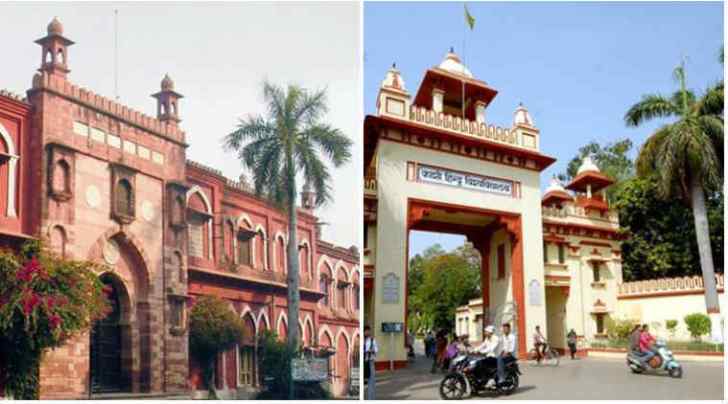 Aligarh Muslim University and Banaras Hindu University
Aligarh Muslim University and Banaras Hindu University
A government audit of central universities has suggested that the words ‘Muslim’ and ‘Hindu’ be dropped from the names of Aligarh Muslim University (AMU) and Banaras Hindu University (BHU), respectively, to reflect their secular character, The Indian Express has learnt.
The suggestion is contained in an audit of AMU by one of five committees set up by the University Grants Commission (UGC) on April 25 at the behest of the HRD Ministry to probe complaints of irregularities against 10 central universities. The AMU audit did not cover BHU but referred to the institution’s name in its report.

Apart from AMU, the institutions that were subjected to an “academic, research, financial and infrastructure audit” by the committees include: Pondicherry University, Allahabad University, Hemwati Nandan Bahuguna Garhwal University in Uttarakhand, Central University of Jharkhand, Central University of Rajasthan, Central University of Jammu, Mahatma Gandhi Antarrashtriya Hindi Vishwavidyalaya in Wardha, University of Tripura and Hari Singh Gour University in Madhya Pradesh. Read | ‘Hindu’ and ‘Muslim’ from university names not to be removed, says Prakash Javadekar
AMU and Pondicherry University were inspected by a committee comprising IIT-Madras professor Shripad Karmalkar, Maharshi Dayanand Saraswati University V-C Kailash Sodani, Guwahati University professor Mazhar Asif and IIM-Bangalore professor Sankarshan Basu.
The panel’s mandate was limited to infrastructure and its academic, research and financial operations in these universities.
In its audit of AMU, the committee suggested that the institution should either be called just ‘Aligarh University’ or be named after its founder, Sir Syed Ahmed Khan. It cited the same reason to recommend that BHU’s name be amended, too.
According to panel members, who did not wish to be identified, the suggestion stems from the logic that AMU, being a centrally-funded university, is a secular institution.
Story continues below this ad
The committee has also described AMU as “feudal” in nature and called for measures to uplift poor Muslims on campus. The report, however, refrained from commenting on the institutions’ minority status as the matter is sub-judice.
The committee, as first reported by The Indian Express on October 1, has also recommended that the selection process of AMU’s vice-chancellor should be tweaked to align it with the appointment procedure followed by other central universities. Currently, AMU has a greater say in appointment process.
The report has also flagged the culture of “inbreeding” in the university, in which a majority of faculty appointments are of its former students. The panel recommended a five-year gap for all ex-students before they can be recruited as teachers in AMU.
The audit said that the university’s tuition fee be increased to help raise more resources internally and the alumni representation on different AMU bodies, such as the university court, should be reduced.
Story continues below this ad
The report has raised concerns over complaints regarding teachers being promoted even when there are no vacant posts and asked UGC to look into such cases.

 Aligarh Muslim University and Banaras Hindu University
Aligarh Muslim University and Banaras Hindu University






























